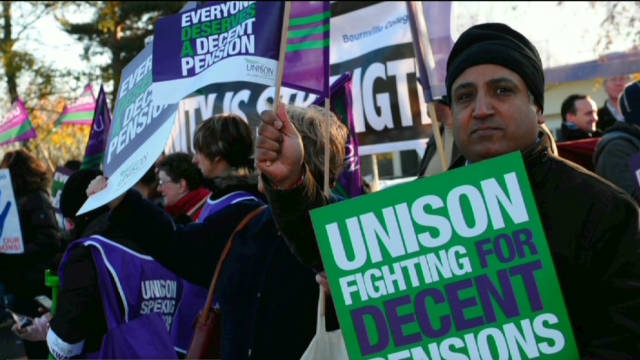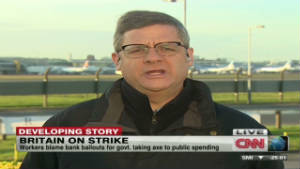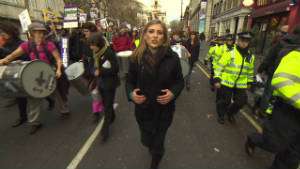
- NEW: 75 people have been arrested in connection with strike protests, London police say
- Occupy London protesters storm a building, say action is in support of strikers
- PM David Cameron says the strike is "wrong" when negotiations are still ongoing
- Workers in the public sector say they are being unfairly penalized for the deficit
Are you experiencing delays and disruption? Send your pics, video to iReport.
London (CNN) -- Mass strikes swept across the United Kingdom Wednesday, with public sector workers walking off jobs in schools, hospitals and police stations to protest proposed pension reforms.
As of lunchtime, the strike appeared to be having a limited impact on many public services, the government said, although more than half of the country's schools were closed, impacting many families.
The unions said up to 2 million public sector workers could go on strike but early indications suggest the total may be fewer.
Prime Minister David Cameron dismissed the industrial action as a "damp squib" -- a fizzled firecracker -- as he answered questions in Parliament Wednesday.

 Massive worker walkout in Britain
Massive worker walkout in Britain 
 Public workers strike in UK
Public workers strike in UK "These strikes are wrong at a time when negotiations are going on," he said.
Chaos was predicted at Heathrow airport near London, one of the world's busiest international airports, but as of mid-afternoon Wednesday operations were normal, officials said.
BAA, the company that operates Heathrow, said lines at immigration counters were moving smoothly thanks to contingency planning to mitigate the effect of strike action by border control staff.
British Airways said it had not canceled any of its own flights, although a few code-sharing flights were called off. BAA could not say how many flights were being canceled. Gatwick airport was reported to be operating normally.
Unite, the country's biggest trade union, said strikes and marches were taking place in cities across the country.
London's Metropolitan Police reported 75 arrests connected to strike protests, about half of them in the east of the capital.
Dozens of Occupy London protesters stormed the offices of a mining company, Xstrata, in central London, saying the action was "in support of all those striking for fair pensions for all today." In a statement, they pointed the finger at corporate greed, saying a few are profiting while ordinary workers suffer.
About 20 Occupy protesters made it to the roof of the building, where they unfurled a banner on the side reading, "Power to the People." The Metropolitan Police said 21 arrests had been made at the site.
The proposed pension reforms have prompted wide anger among public sector workers, many of whom say they are bearing the brunt of austerity measures imposed to try to rein in Britain's deficit.
Chancellor George Osborne, the British finance minister, downgraded Britain's growth forecast Tuesday, saying that while it had regained stability after the financial crisis, it had been "hit by a series of shocks which have significantly weakened the economic and fiscal outlook."
His Conservative Party, which governs in a coalition, is committed to a major austerity program of tax hikes and spending cuts, against a backdrop of rising unemployment, falling household income and a large public debt.
Cameron insisted the proposed pension reforms are necessary. "We have a responsibility to deliver an affordable public sector pension system," he said.
"We believe public sector pensions should be generous but as people live longer it's only right and only fair that you should make greater contributions."
Cameron criticized the opposition Labour Party over its attitude toward the strike, charging that Labour leader Ed Miliband "is in the pocket of the union leaders" and so cannot recognize a "very generous offer" to public sector workers.
Miliband said he had huge sympathy for those who had walked out because the government had put them in an "impossible position" by failing to negotiate properly.
Cabinet Office Minister Francis Maude told Parliament that the number taking part in the strike was lower than the unions had predicted.
He said that 135,000 civil servants were on strike as of 11 a.m., a little more than a quarter of the total. Very minor delays had been reported at some sea ports, he said, and airport services are being maintained. The strike has closed about 60% of the state-funded schools in England, Maude said.
Overall, the National Health Service is coping well, he said. "Early indications are that the strike is only having a minor impact on patient services, largely mitigated by robust contingency planning."
He condemned the industrial action as "just plain wrong," saying reforms to public sector pensions were "long overdue" and that the offer on the table protected those who were lowest paid, among them many women.
Maude also rejected claims that negotiations between the government and unions had broken down as "simply not true," saying talks were continuing.
Union leaders say it is unfair to expect public sector workers to pay more into their pensions, work longer and accept worse terms for their pensions.
Brendan Barber, general secretary of the Trades Union Congress, said the unions were "sending a crystal clear message to the government that we are strong, that we are united, and that our campaign will go on until we secure justice and fairness for every public servant."
No one takes industrial action lightly, he said, "but when unfairness is piled on injustice you are right to take a stand and I am proud to stand with every single one of you."
The Unison union said it expected its 400,000 National Health Service workers -- including nurses, paramedics, cleaners, cooks and patient transport -- to strike Wednesday, except for emergency workers.
The union said it did not expect emergency services to be affected, but some routine operations and clinics were canceled.
The NHS estimates that about 20% of staff are on strike.
The Home Office said "robust arrangements" were in place at airports and points of entry to compensate for the strike, with managers, contractors and foreign staff trained up to fill the gap.
"Securing the border is our priority and over the last weeks and months we have considered all options to ensure we are prepared for union action," UK Border Agency chief executive Rob Whiteman said in a statement.
The action comes a day after Osborne, the Chancellor, announced a pay raise cap of 1% for public sector workers for two years after the current pay freeze ends, as he lowered growth forecasts in an assessment of the economy.
His report blamed higher-than-expected inflation, the uncertainty created by the crisis in the eurozone and the impact of the 2008-2009 financial crisis, the full scale of which is now clearer.
The Labour Party argues that the poor growth is a result of the government's spending cuts and tax hikes, which it says have squeezed the recovery too hard.
CNN's Jim Boulden, Erin McLaughlin, Laura Smith-Spark, Jack Maddox and Faye Clark contributed to this report.
No comments:
Post a Comment